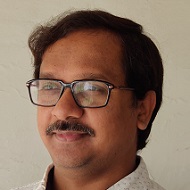Shrirang Bhoot is the Chief Technical Officer at Global Product Compliance Group, working as a consultant to achieve all compliance related requirements for client companies. His primary responsibility is the development and implementation of appropriate procedures to ensure a sustainable chemicals management approach through ensuring adherence to chemical regulations such as EU REACH, K-REACH, and EU BPR. Shrirang is also involved in developing services within various global regulations, as per their respective compliance requirements, requiring thorough study of each regulation and its compliance requirements. His main activities involve performing initial client assessments and analyses in order to suggest regulatory solutions as per their requirements towards sustainable chemicals management, as well as keeping up to date information related to regulatory developments in the field. Shrirang has also been involved in the development of Indian Chemicals (Management and Safety) Rules which are expected to come into force shortly.
Shrirang is currently involved in a project to develop a strategy to assess persistence, bioaccumulation, and toxicity (PBT) of chemicals in the environment, with the help of experimental data generated through collaboration with academic institutes around the globe. To comply with the regulatory requirements in Europe, chemicals must be registered with European authorities, for which it is mandatory to complete PBT assessments for each chemical. Due to a lack of available data for industrial chemicals, it can often be difficult to complete exact PBT assessments. Shrirang therefore initiated a collaboration with academic institutes in Denmark and India to perform the environmental impact assessment necessary and, along with his team, will complete the PBT assessment. He also plans to generate data for selected chemicals, as well as a model for completing environmental impact assessments.
Shrirang completed a master’s degree in Environmental Science and Engineering at the Indian Institute of Technology (IIT), Delhi. Following completion, he joined a not for profit organisation where he was involved in an EU funded project studying various EU regulations and their impact on non-EU suppliers. The organisation additionally worked to generate awareness, and to gauge preparedness, amongst the Indian industry of upcoming challenges related to new environmental regulatory requirements as a part of extended producer responsibility principles. Shrirang was also involved in various other projects related to the Sustainability Industrial Network, for example, studying the entire supply chain of the textile/apparel and leather industries, and was also involved in guiding the industry towards best practices in cleaner technology and waste minimisation techniques to make these supply chain networks more sustainable. Through this experience, Shrirang has gained extensive experience of regulatory compliance requirements, progressing to his current role where he is now guiding the chemical, agro-chemical, and cosmetic industries towards various environmental regulatory compliance requirements across the globe.
In the future, Shrirang would like to work towards developing standards for the industry from a sustainable chemical management perspective. These standards would set the tone for the industry in that they would not require any additional compliance requirements as part of regulatory compliance and would form a globally accepted standard by which to define the quality and safety of the products from various chemical industries. He has an additional ambition to work in the field of developing qualitative/quantitative structural activity relationship (QSAR) models for undertaking PBT profiling of chemicals.
Shrirang joined the IES as a Full Member in 2020 in order to share learnings with colleagues and to meet like-minded people working in the environmental and sustainable development fields.




